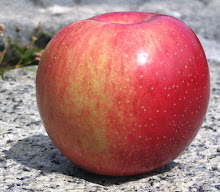The big distributors keep apples fresh by refrigerating them and by suppressing the fruit's natural production of ethylene. This relatively simple hydrocarbon is in effect an apple hormone that triggers ripening, overripening, and rotting.
One widely used technique is to store apples in airtight rooms from which oxygen has been reduced (from 21% to about 5% or less). Storage facilities also may control humidity and carbon-dioxide content, and use ethylene scrubbers.
These techniques are know as controlled atmosphere storage and facilities are licensed (here are some typical requirements). The apple industry often just refers to this as "CA."
Apples may also be treated to inhibit ethylene production with compounds like Smartfresh. Despite some controversy and health concerns, Smartfresh is widely used in North America; if you eat apples year round you've probably had some preserved in this way.
Smartfresh also suppresses an apple's natural aroma and potentially changes its flavor. (The effect wears off out of storage.) So if you've had a crisp apple, especially out of season, with no smell, there was probably something in the air where your apple was waiting for you.
Note: We can't use industrial techniques like these, but there are steps we can take to keep apples fresh.

Comments
Post a Comment
Join the conversation! We'd love to know what you think.